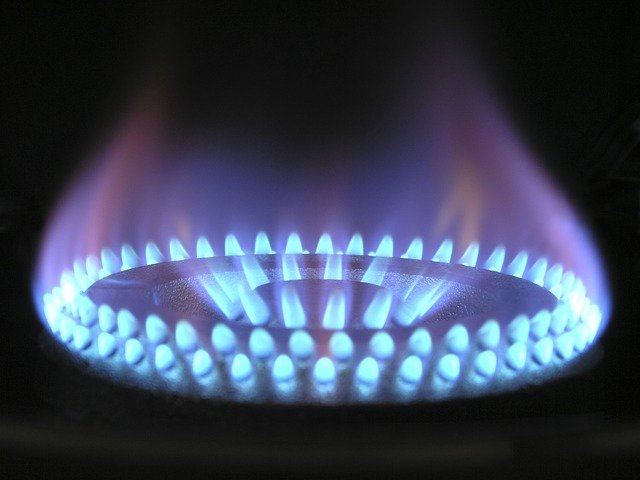No one likes to be in the middle of a smoking session to discover that their propane tank has emptied out and is in need of a refill. It is the surest way to stop a party dead in its tracks. However, gas of course must run out, but how do you know if your smoker is using too much?
If you have a twenty-pound propane tank with a BTU of 432,000 and a gas smoker with a BTU of 15,000, you will get about 28 hours worth of smoking. This is figured by dividing the two numbers and can be easily calculated for different BTU capacity levels with varying grills and propane tanks.
All in all, gas smokers are not considered to be huge gas guzzlers, but they certainly burn through, especially if you are smoking for long amounts of time with higher levels of heat. Just as you would have to restock pellets though, you have to refill gas. So, it comes down to a simple “pick of your own poison”. Keep on reading to understand how to calculate your gas smoker’s gas usage and other things to remember when using this type of equipment.
How to Determine How Much Gas Your Gas Smoker is Using
This may seem like the kind of task that is reserved for those who belong in a science lab or with an engineering squad, however, do not be intimidated, determining how much gas your smoker is using is easy as can be. What you have to realize is that every smoker and every propane tank is going to have a different number when calculating this total. Therefore, there is no standard usage amount. So, you will have to tailor it to your specific equipment.
To determine how much gas your gas smoker is using, first, determine the British Thermal Unit (BTU) of the smoker and propane tank to understand your equipment’s efficiency. Then, multiply these results by the volume of the smoker to determine the projected gas usage by your gas smoker.
Ok, so, first, you have to figure out what your propane tank and smoker’s BTU is. “What is BTU,” you ask? BTU, as stated above, stands for British Thermal Unit and it is the unit of measurement used to figure out the efficiency of different appliances.
How this translates to your smoker and your propane tank is how much energy your smoker uses in order to burn off one pound of fuel. Therefore, if you have a twenty-pound propane tank, you would think it would last much longer, but maybe not.
To get to the nitty-gritty of energy usage, find the BTU-rating on your propane tank and your smoker. Once you have these levels, divide the smoker’s BTU-rating with the propane tank’s rating. After this, multiply the results with the tank’s volume and you will know just how much gas your smoker is burning through. Really, the process is quite simple. The most difficult part is searching for those numbers!
Example of Determining How Much Gas Your Gas Smoker is Using
Let’s say you have a twenty-pound propane tank. Its BTU rating is 21,600 and your smoker’s BTU rating is 20,000. Divide your propane tanks BTU by your smokers (21,600/20,000 = 1.08) then multiply the result (1.08) by the volume of your propane tank (1.08 x 20) which will give you your final result (21.6). 21.6 is thus translated into hours and you have your final results.
This means that your propane tank (at the specific volume provided in this example) and smoker can give you 21.6 hours worth of burning before it runs out. Depending on how long you smoke each session, this can go a very long way, or it can be used up quickly.
Based on the measurements in this example, if you plan to smoke 8-10 hour sessions each time, you will have about three uses before you have to fill your propane back up. But if you have shorter sessions with items like fish (that take quite a bit less time to cook thoroughly), your propane will stretch quite a bit.
At the end of the day, there are so many different variables that play into how much gas your smoker is using and how far that gas can be stretched. It depends on the size of your propane tank, the frequency in which you plan to smoke, the level of heat that you use with each smoking session (the use of higher heat is going to burn more gas), and how long each smoke will take.
Gas smokers can be very efficient or real guzzlers- it all depends on the particular product, what is being smoked, and how the user prefers to use the equipment.
Tips for Using a Gas Smoker Efficiently
Gas smokers are a fantastic option for those of you who want to smoke but do not necessarily want to fool with charcoal or wood-burning units. They are efficient, are totally capable of smoking your meats and other dishes to perfection, and are not lacking when it comes to the smoky flavor that so many are looking to achieve when they hit the grill.
There are a few tips and tricks to keeping your gas smoker running well and your food tasting great. Primarily, you want to keep your gas smoker clean and be conscious of the temperature you are using while smoking. These will allow for more efficient cooking which reduces the use of unnecessary gas.
Let’s take a closer look.
Keep Your Gas Smoker Clean
One of the biggest mistakes that users of gas smokers make is that they do not clean their gas smokers often enough or even well enough. What is so great about gas smokers is that it does produce a clean burn. Many times, users think that this means they can forgo the cleaning step and keep on smoking.
However, when you are cooking all sorts of different meats, fish, and veggies, food waste is produced and it makes its way into your smoker. If you open your smoker and see that there is black or brown build-up along the walls and on the top of your smoker, then it needs to go.
Also, be sure to check the actual smoking rack itself for food that has decided to stay much longer than it is welcomed. Simply grab some warm water, get it lightly soapy, and gently scrub the surfaces with either a rag or a plastic bristle brush. Avoid using anything metal, as it can scratch the interior of your smoker.
Once you have it nice and clean, go over the areas again with only water to make sure that you have removed any soap residue. After you have done the final once-over, dry each spot and let your smoker air out for a bit to make sure moisture gets trapped inside.
This should be done every few uses to ensure that no excessive build-up occurs and that your smoker remains good as new. Maintenance is quick and easy if you practice it often, and it can help to increase the longevity of your propane tank in the reduced gas waste.
Be Conscious of the Temperature
Many times, when people think of using propane, they think of a gas grill. With gas grills, you are typically using very high temperatures to cook things at a relatively fast rate, but this is not the case with gas smokers. Smokers, at their very essence, are intended to smoke at low and slow rates in order to deliver the most tender meats. This same concept applies to gas smokers.
Gas smokers are not designed to rage at high temperatures for hours on end. Instead, they are made to mostly smoke at low temperatures to ensure the maximum tenderness and smoky flavor for all of your dishes.
You want to make sure that you do not treat your gas smoker as you would a gas grill. With very different purposes and styles of cooking, it is important to tend to how they were designed to be used. This will result in the most effective smoking experience and the greatest reduction of gas waste.
Finally, most gas smokers will come with built-in temperature gauges so you can monitor your heat levels throughout each smoking session. If you want to really track how much heat is getting to your meat, a digital meat thermometer is a fantastic option to ensure that your food is not under or overcooked.
At the end of the day, a scorched dish does nothing but ruin all your smoking dreams. Watch that temperature and you will be pleased every time. Then, using a clean gas smoker and keeping an eye on how much gas your gas smoker is using, you can monitor your needs for altering methods of cooking or finding a more efficient gas smoker.
Scot has loved smoking food in his free time for the last few years. Each major holiday or off-weekend, Scot spends days testing and prepping new recipes for perfection.

